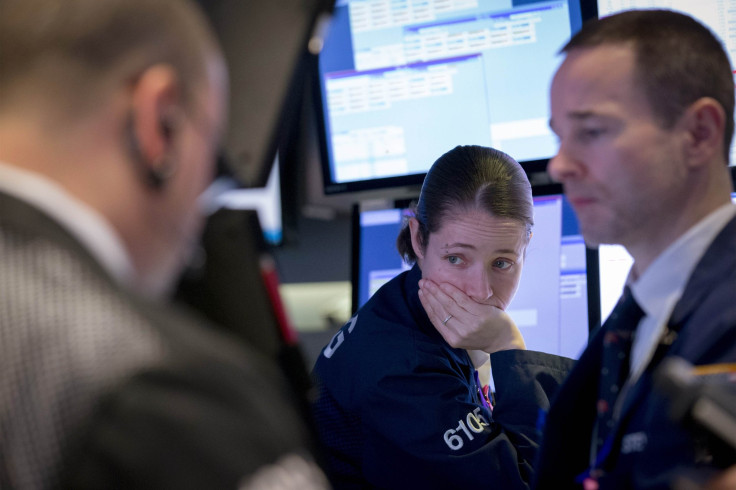Dow Jones Industrial Average Plunges 250 Points, Down 3.7% In 2015

U.S. stocks closed lower Friday, with the Dow Jones Industrial Average plunging more than 250 points, after data showed the U.S. economy’s growth cooled last quarter. They contributed to a mixed picture of the global economy, with crude-oil prices continuing to hover around six-year lows last seen during the so-called Great Recession. However, consumer sentiment soared to its highest level since 2004 this month, driven by optimistic U.S. consumers who anticipated the economy would expand and create new jobs at the best rate in the past decade.
Also weighing on global markets Friday were fears over Greece and Russia’s economy. Greece announced it will not seek an extension of the country’s massive $270 billion bailout program, while Russia’s central bank cut its key interest rate to 15 percent, sending the ruble tumbling to a record low against the dollar.
During January’s last trading session, the Dow Jones Industrial Average, measuring the share prices of 30 large industrial companies, plunged 251.90 points, or 1.45 percent, to close at 17,164.95; the S&P 500 stock index dropped 26.26 points, or 1.30 percent, to end at 1,994.99; and the Nasdaq Composite dipped 48.17 points, or 1.03 percent, to finish at 4,685.33.
The Dow has fallen 3.7 percent so far in 2015, while the S&P 500 and Nasdaq have shed 3.1 percent and 2.1 percent this year, respectively.
U.S. Consumer Sentiment Leaps To 11-Year High
Consumer sentiment hit 98.1 in January, up from 93.6 in December, the Thomson Reuters/University of Michigan’s final reading for January showed Friday. Meanwhile, separate data Tuesday showed U.S. consumer confidence rose sharply in January and is now at its highest level since August 2007, as a more positive assessment of current business and labor market conditions contributed to the improvement in consumers’ view of the present situation. The Conference Board’s Consumer Confidence Index rose to 102.9 in January, up from 93.1 in December.
However, the reports came as the U.S. economy grew slower than expected last quarter. Gross domestic product, the broadest measure of goods and services produced across the U.S. economy, grew at a seasonally adjusted annual rate of 2.6 percent in fourth quarter, missing analysts’ expectations for 3.1 percent, according to analysts polled by Reuters.
But the government’s report did reveal something promising: Consumers spent more during the busy holiday shopping quarter. Consumer spending, which accounts for almost two-thirds of the U.S. economy, increased 4.3 percent in the fourth quarter, compared with an increase of 3.2 percent in the third, the Commerce Department said in the report.
Overall, the U.S. economy grew 2.4 percent, the strongest growth since 2010 following the global financial crisis.
Oil Prices Rally 8%, Best Day Since June 2012
Oil prices have fallen more than 40 percent since June. While falling oil prices serve as a headwind for the global economy in the long term, experts say its effects constitute a tailwind for the U.S. economy in the short term as gas prices continue to decline. The average cost of gas in the U.S. is $2.05 per gallon, down $1.22 from a year earlier, according to gasbuddy.com.
“Consumers expect the renewed economic strength to create more jobs, but the only boost to their discretionary incomes has been due to falling oil prices,” Richard Curtin, chief economist at the Surveys of Consumers, said in the University of Michigan consumer-sentiment report.
The futures contract for the U.S. benchmark West Texas Intermediate crude, or WTI, leaped 8 percent Friday to settle at $48.24 a barrel for March 15 delivery at the CME Group. It was the commodity’s best day since June 2012. Meanwhile, Brent crude, the benchmark for global oil prices, rose more than 3 percent Friday, to more than $53 a barrel, for March 15 delivery on the London ICE Futures Exchange, its biggest one-day gain since 2009.
But without stronger growth, economists warn consumers will limit spending on price discounts, adding to disinflationary pressures, Curtin said in the consumer-sentiment report. “Renewed wage growth is needed to bolster credit usage amid rising interest rates.”
The Federal Reserve vowed to remain “patient” Wednesday on raising interest rates from their historic lows, despite the central bank showing confidence in U.S. job growth. But the Fed warned that inflation has continued to decline below the central bank’s target, largely due to the declines in energy prices.
Wall Street’s Week Ahead: US Jobs Report
The U.S. Labor Department is scheduled to release next week the U.S. nonfarm payrolls report for January. The report, due out Feb. 6, is expected to show U.S. employers added 235,000 jobs in January, down from 252,000 in December, according to analysts polled by Thomson Reuters. The unemployment rate is expected to have remained unchanged at 5.6 percent last month.
© Copyright IBTimes 2024. All rights reserved.












